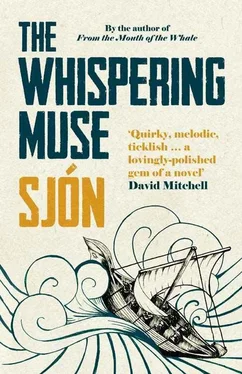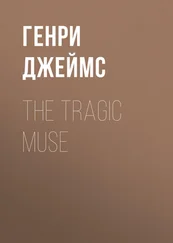‘I should be fascinated, Mr Mate, to hear you relate the story of the prop, if I may call it that, which you use for your storytelling.’
Thus I gave the appearance of taking an interest in my obsessive dining companion, who by virtue of his role as host was the highest ranking officer on board the MS Elizabet Jung-Olsen that evening.
‘Ah, that…’ he said, obviously pleased that I had provided him with an opportunity to discourse at length about himself. He reached into the inside pocket of his uniform jacket and took out the piece of wood:
‘This is a splinter from the bow timber of the Argo.’
He balanced the splinter on his palm carefully, as if the slightest draught could blow it away, and held it up to the candlelight to give me a better view. The stick looked like nothing so much as a piece of rotten driftwood of the type that used to wash up on the shore in my youth: bored by worms, gnawed by insects, polished by wind and water, hammered by rocks. I leant forward and sniffed the wood: nothing. Or was there? Yes, there was a faint tang of salt mingled with the odour of damp soil. And to my astonishment I became aware of a once familiar stirring in a certain part of my anatomy, in the nether regions, so to speak:
Good gracious me! I thought, dropping the napkin over my lap and straightening up in my chair:
‘But how does it work?’
The mate withdrew his hand and raised the piece of wood to his right ear:
‘You’ve seen me listening to it, sir…’
He made an amateurish pretence of listening to the wood chip:
‘I hear something that could best be compared to the soporific hiss of our short-wave radio receiver: as if a handful of golden sand were being shaken in a fine sieve. This sound caresses the eardrum so gently that before you know it your ear has been lulled to sleep. Then I hear a faint humming through the hiss. At first I think I’m mistaken, but no, I hear it again — rising and falling, over and over, unvarying.
‘Once the ear has fallen asleep, the humming takes on a new form. It becomes a note, a voice sounding in the consciousness, as if a single grain of golden sand had slipped through the mesh of the sieve and, borne on the tip of the eardrum’s tongue, passed through the horn and ivory-inlaid gates that divide the tangible from the invisible world.
‘At first it is wordless, like crooning over a cradle, then it swells into a song. The singer is a woman.’
‘Now, there’s a surprise…’ I remarked rather loudly, inadvertently interrupting Mate Caeneus.
‘I beg your pardon?’
‘Never mind…’ I answered, adding, ‘I think the pork chops must have disagreed with me.’
While the mate droned on about his piece of wood, I wondered whether oak trees had genders and whether the reason for the unexpected response in my nether regions to the smell of the splinter was that it had been split off a female tree.
‘As you will remember, sir, Athena fitted the bow timber into the many-nailed Argo and the nature of her gift was such that it had the power of human speech. Without it we would never have found our way through the Bosphorus, across the Black Sea to Colchis, up the Donau and her tributaries, into the Baltic and North Sea, and from there north across the Atlantic to cruise off the chill island of Thule, that strange land shrouded in eternal darkness, where the water boils of its own accord in the snow. Indeed, it was on the black sands of Ultima Thule that we Argonauts, first of mortal men, saw the gleam of Helios’ harp strings as he dwells with the Hyperboreans and tunes his instrument beneath the vault of the world. Without the guidance of the loquacious oak we would not have known to turn our ship south-south-east and thus find the way home to the civilised world of the Mediterranean.
‘After this journey we mortal men had somewhat humbled the pride of blue-haired Poseidon, for by our successful voyage one could say that we Argonauts had conquered great territories in his watery realm.’
‘Excuse me…’
Here I raised a finger:
‘Pray excuse me, good host, I have to go and spend a penny.’
Mate Caeneus:
‘Of course…’
I hurried to the lavatory and relieved myself. ‘He’ was perhaps not quite as sprightly as the last time this fit was upon him — but he was lively enough. Yes, it gladdened my old heart to see how much vigour the scent of the precious speaking wood had injected into ‘the old chap’.

When I returned to the saloon I noticed that Caeneus had refilled our brandy glasses. His glass, that is to say, for I myself had been sipping my drink sparingly — not wishing to abuse Magnus Jung-Olsen’s hospitality — whereas the mate was becoming a little the worse for wear.
I sat down beside him without comment, then ventured to suggest something that had occurred to me in the lavatory:
‘I was thinking: could the voice you detect in the humming of the wood be your own voice? Like the poet who obstinately believes that he is writing about the world but is in reality only telling yet another story about himself?’
The idea was not entirely my own. My brother-in-law, the psychiatrist Dr Pázmány, had said something similar when the invisible people moved in with me during the winter of 1910–11. However, Mate Caeneus’s response to this little theory of mine — which was only a friendly suggestion — was to scowl and pout and rest his cheek on his hand while his black eyes stared into space.
A good while passed in this manner. I kept silence with him, and it didn’t occur to me to try and explain my words or elaborate. I was becoming used to the crew members’ tendency to behave as if everything I said was incomprehensible, to remain silent for just as long as I was speaking, then carry on from where they had left off, treating me like some guano-covered rock that one must steer a course around. While we two sat in silence over our brandy glasses, I amused myself by trying to work out what the mate was staring at — no doubt he would soon take up the thread from where he had left off when I slipped out to answer the call of nature. It seemed to me that his gaze was resting halfway between the teaspoon and the crumb of French bread just above the middle of the table, a little to the right from his point of view.
But, as it happened, the mate did not yield, any more than a chess piece that has already been played. I had, so to speak, the floor. The clock was ticking on my side. But instead of following up my previous comment by stating the obvious: ‘when your gaze is so abstracted that you seem to see beyond field and forest, you are in fact staring at what stands closest to you; yourself’, courtesy bade me say:
‘Has this awe-inspiring object been in your possession long?’
Mate Caeneus’s large, curly head lifted from his hand. He looked at me enquiringly. To my horror I saw that his left eye, which had been resting on his palm, was full of tears. He cleared his throat and answered as if from the dregs of sleep:
‘You read my thoughts, sir. I was just recalling the terrible night I acquired this talkative stick.’
The mate seized his brandy glass from the table, raised it to face level and looked over the brim — straight into my eyes:
‘Your health, shipmate Haraldsson!’
The saloon clock struck twelve.
BY THE END I was having difficulty following the plot, both because the storyteller’s words had become slurred with drink and because my own head was nodding. But so much is certain: the mate told me that one night, long after the Argonauts had returned home with the golden fleece, he was down on the waterfront in the city of Corinth. The weather was bad and there were few people abroad apart from Caeneus himself and his companions, a few squawking herring gulls and a clutch of adolescent kittens that he stressed had been both ill-favoured and irksome. By this stage in the story the hero’s world had suffered such an ill wind that his errand to the boat shed was to scavenge for something to eat. There he could usually find fish guts left over from the day’s catch, rotting crustaceans and dubious scallops, if his luck was in.
Читать дальше













